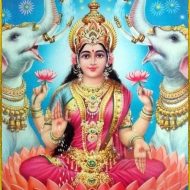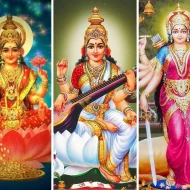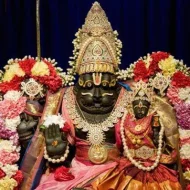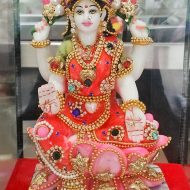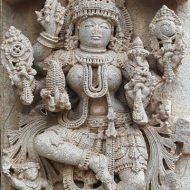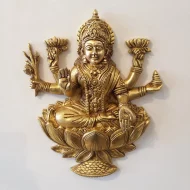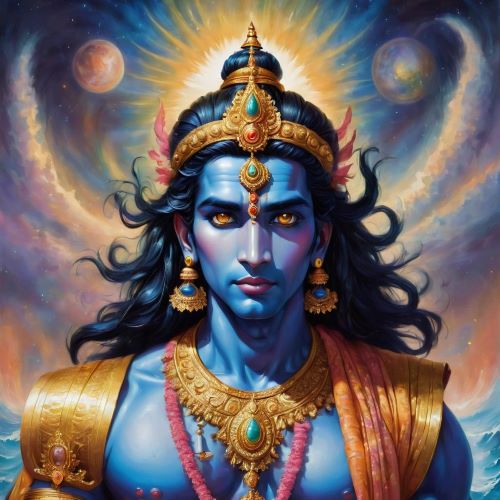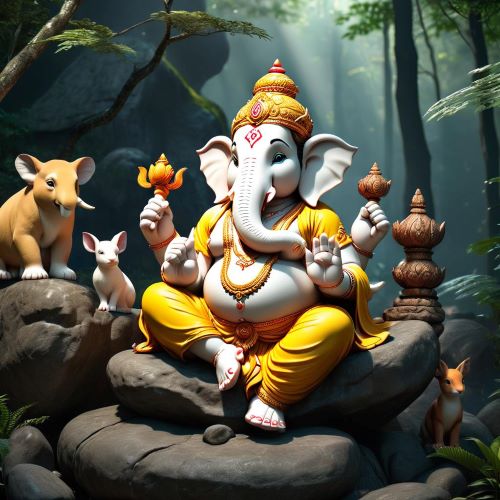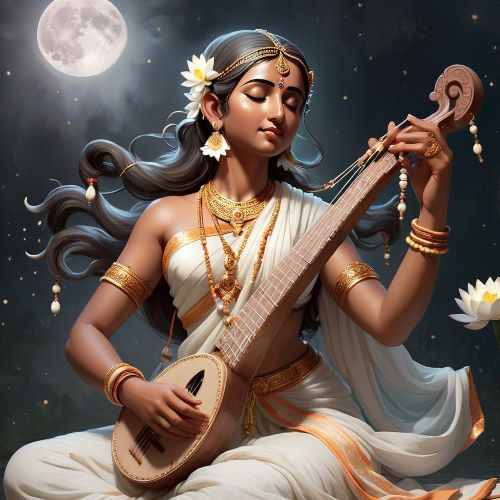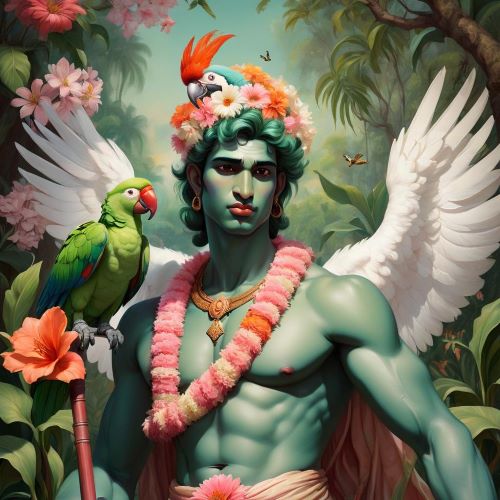Lakshmi : Goddess of Wealth
Listen
At a glance
| Description | |
|---|---|
| Origin | Indian Mythology |
| Classification | Gods |
| Family Members | Vishnu (Husband), Kamadeva (Son) |
| Region | India, Thailand, Indonesia, Nepal |
| Associated With | Wealth, Prosperity |
Lakshmi
Introduction
Lakshmi, also spelled as Lakṣmī, is the revered Hindu deity embodying wealth and good fortune. She is often depicted as the wife of the prominent god Vishnu, and together, they are frequently venerated as Lakshmi-Narayana. Much like her divine consort, who assumes various forms when descending to Earth, Lakshmi assumes diverse manifestations.
According to Hindu tradition, Lakshmi takes on different forms to accompany Vishnu in his incarnations. For instance, during Vishnu’s incarnation as the dwarf Vamana, she emerges from a lotus as Padma or Kamala, both names signifying “Lotus.” When Vishnu appears as Parashurama, the warrior who wields an axe, Lakshmi becomes his spouse Dharani. And when Vishnu incarnates as King Rama, she assumes the role of his queen, Sita.
Physical Traits
In artistic representations, Lakshmi is often depicted seated gracefully on a lotus, characterized by her ample bosom, generous hips, and benevolent smile. Sometimes, she is depicted being ritually bathed by a pair of elephants pouring water over her. Her symbolic vehicle is the white owl. Modern Hindus continue to worship Lakshmi, especially in domestic settings (typically on Fridays) and during various festivals throughout the year. She also holds a position of reverence in the Jain tradition.
In some representations, Lakshmi is seen holding a jar of money, which signifies both spiritual and material wealth. Her open hands and face are in a mudra, which represents compassion or charity. She usually wears a red dress with golden threads. She is often depicted with her husband, Vishnu, who is the god of peace and justice. This symbol suggests that prosperity and wealth are linked to the maintenance of both peace and justice.
Family
A prominent myth narrates her birth from the churning of the ocean of milk, rising from a lotus while holding another blossom in her hand. This event, known as the churning of the ocean, is a significant episode in Hindu cosmology and mythology, and it sparks a dispute between the gods and demons over her possession. According to Harivamsa, Lakshmi offered herself to Vishnu’s protective power and gave herself to his protection. She is also the mother of the god of love, Kama.
Other names
She is known by many other names including Aishwarya, Apara, Aruna, Atibha, Harivallabha, Hemamalini, Hiranyavarna, Indira, Jalaja, Jambhavati, Janaki, Janamodini, Jyoti, Jyotsna, Kalyani, Kamalika, Ketaki, Purnima, Radha, Ramaa, Rukmini, Samruddhi, Samudra Tanaya, Satyabhama, Shraddha, Shreeya, Sita, Smriti, Sridevi, Vasudhara, Vasundhara, Varada, Varalakshmi, Vedavati and Viroopa.
Powers and Abilities
During Diwali, the festival of lights, Hindus fervently worship Lakshmi for material prosperity. Businessmen worship their account books, while farmers offer sacrifices for a bountiful harvest. Clay images of Lakshmi and Ganesha are revered for good luck. People place candles outside homes to invite her blessings. Diwali also involves invoking Lakshmi to counter the effects of demon king Bali’s rule, with rituals and lamp lighting.
Various festivals focus on Lakshmi’s relation to Vishnu. She is celebrated as a devoted wife during festivals where her marital bond with Vishnu is highlighted. Lakshmi is worshiped during Kaumudi-purnima and Durga-Puja for her ability to renew crops and bestow blessings. Devotees regularly make vows (vratas) to seek her blessings for marital fidelity, wealth, and more. Her reputation for granting luck has made her widely worshiped.
In some circles, Lakshmi is elevated to a supreme status among Hindu deities. In the Pancaratra tradition, she’s paramount in creation as the embodiment of Vishnu’s creative energy (shakti). She represents the divine principle and is central to the Pancaratra conception of the Absolute. In the Lakshmi-tantra text, she alone bestows grace upon devotees, emphasizing her significance.
Modern Day Influence
Lakshmi remains a central figure in Hindu worship. Devotees seek her blessings for wealth, prosperity, and overall well-being. Her worship is a common practice in households, temples, and during various festivals like Diwali. Her association with wealth and prosperity extends to economic and financial spheres. Many businesses and entrepreneurs invoke her blessings for success, growth, and financial stability. She symbolizes the ethical acquisition and utilization of wealth.
Lakshmi’s stories and symbolism continue to inspire literature, music, films, and other forms of media. Her narratives may be woven into contemporary stories to convey themes of fortune, devotion, and spirituality. Lakshmi’s influence isn’t restricted to India alone. Hindu communities around the world, particularly in countries with a significant Indian diaspora, continue to venerate her and celebrate her festivals.
Related Images
Frequently Asked Questions
What is lorem Ipsum?
I am text block. Click edit button to change this text. Lorem ipsum dolor sit amet, consectetur adipiscing elit. Ut elit tellus, luctus nec ullamcorper mattis, pulvinar dapibus leo.
What is lorem Ipsum?
I am text block. Click edit button to change this text. Lorem ipsum dolor sit amet, consectetur adipiscing elit. Ut elit tellus, luctus nec ullamcorper mattis, pulvinar dapibus leo.
What is lorem Ipsum?
I am text block. Click edit button to change this text. Lorem ipsum dolor sit amet, consectetur adipiscing elit. Ut elit tellus, luctus nec ullamcorper mattis, pulvinar dapibus leo.
What is lorem Ipsum?
I am text block. Click edit button to change this text. Lorem ipsum dolor sit amet, consectetur adipiscing elit. Ut elit tellus, luctus nec ullamcorper mattis, pulvinar dapibus leo.
What is lorem Ipsum?
I am text block. Click edit button to change this text. Lorem ipsum dolor sit amet, consectetur adipiscing elit. Ut elit tellus, luctus nec ullamcorper mattis, pulvinar dapibus leo.



